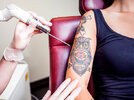- Points
- 0

There are numerous motives for getting tattoos or body piercings. Please keep these health and safety considerations in mind if you are thinking about getting a tattoo or piercing.
How to spot a secure studio:
If you're thinking about getting a tattoo or a piercing, pick a reputed, safe shop. It is essential that sufficient safety and sanitary precautions are taken. If people attempt the surgery on themselves or others, the risks rise noticeably.
- The studio area and employees should be spotless. There should be distinct sections in the studio for tattooing and body piercing.
- The studio needs an autoclave, which it should use (equipment used to sterilise the necessary equipment). Do not consent to a procedure if there is no autoclave.
- Before the process, all needles and other "sharps" should be opened (from individual packets) in front of you.
- Each technique should be performed with fresh latex gloves on the staff.
- The use of a piercing cannon is not advised since it cannot be fully sanitised in an autoclave and may transmit infections.
- Only non-allergenic metals, such as stainless steel of the 300 series, gold, niobium, titanium, or platinum, should be used to make jewellery for piercings, and a range of sizes should be offered.
- Tattoo inks ought to be collected in a single-use cup before being discarded. Never remove ink directly from the main source bottle or put it back in the same bottle!
- Inquire about instructions for aftercare. Before getting a tattoo or getting your ears pierced, read and comprehend the guidelines.
- Ask inquiries! How long has the person had tattoos or body piercings? Do they possess knowledge? Seek out images of their previous work. How about it?
- Inquire if it is possible to observe the preparation and actual piercing or tattooing of another individual. Although not all studios will permit it, you can get the chance to observe the sterilising and methods.
- If the personnel or a studio makes you feel uneasy,
Self-care for tattoos:
It takes a few weeks for a tattoo to heal. They will eventually heal. The scabs will peel away. Do not scratch or pick at your tattoo, no matter how irritating it may be! Pay attention to the instructions your tattoo artist provides you and seek medical attention if required.
- Anywhere between an hour and the following morning after getting your tattoo, remove the bandage.
- Wash your tattoo gently with mild antibacterial soap as it heals. Dry with a pat, not a rub. When scabs start to flake off, apply a thin coating of ointment. Use an ointment such as A&D, vitamin E, tea tree, or a substance that your tattoo artist has advised. Apply a high-quality moisturising skin lotion to your tattoo after it has healed to maintain its health.
- Swim or soak in the tub only when your tattoo has completely healed.
- Your tattoo will be harmed by sunlight. For the rest of your life, always use sunscreen with a high SPF factor on your tattoo.
A dermatologist or plastic surgeon can remove it. The technique can be expensive, and the results might be extremely unpredictable. If you're thinking of getting a tattoo, consider it permanent.
